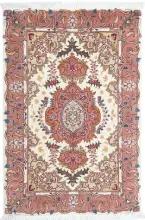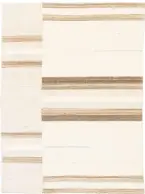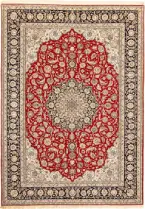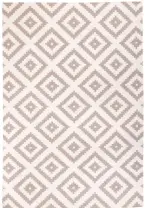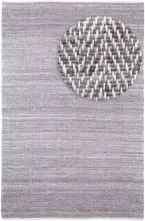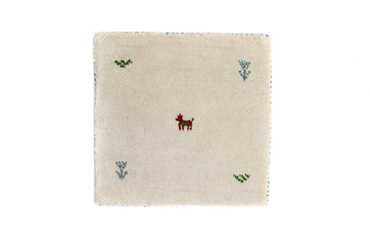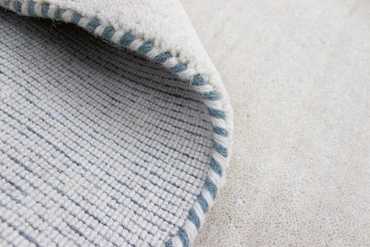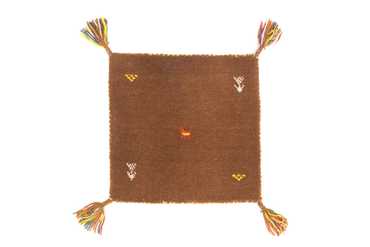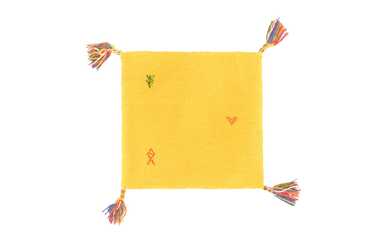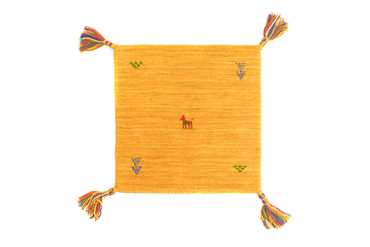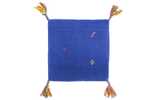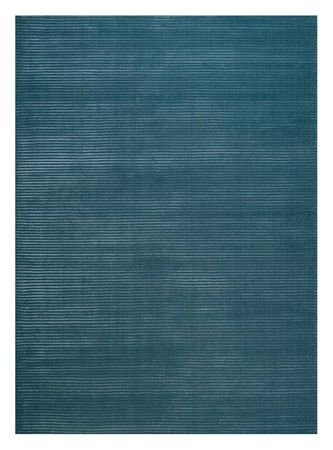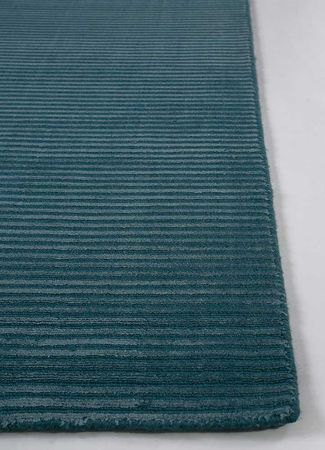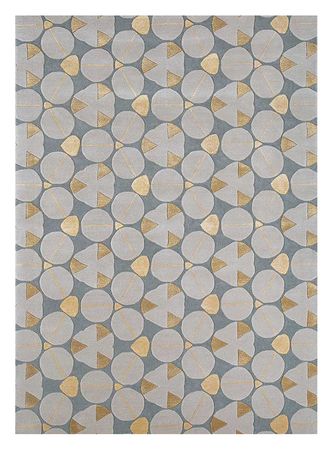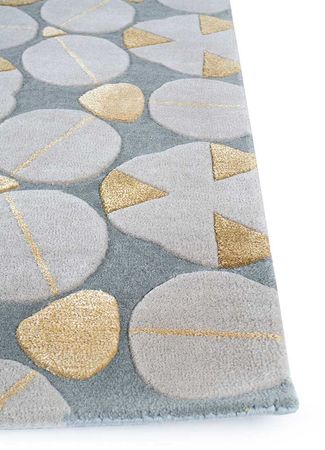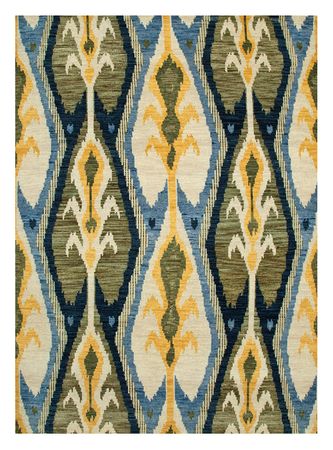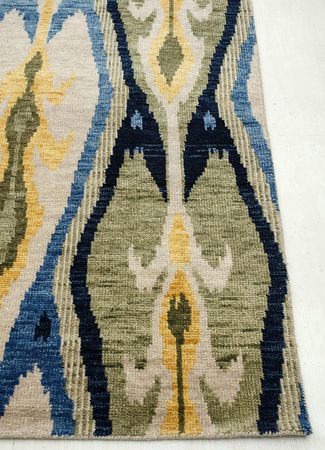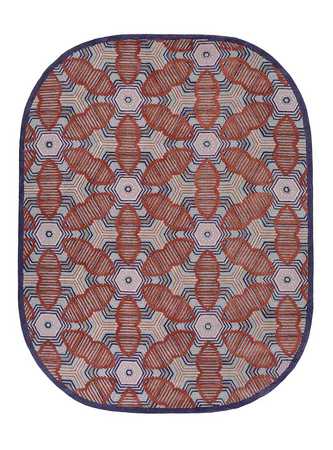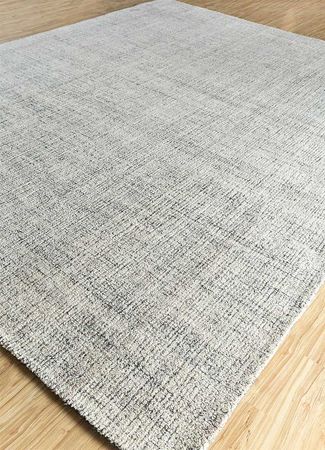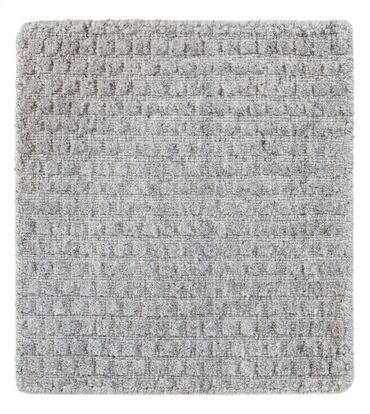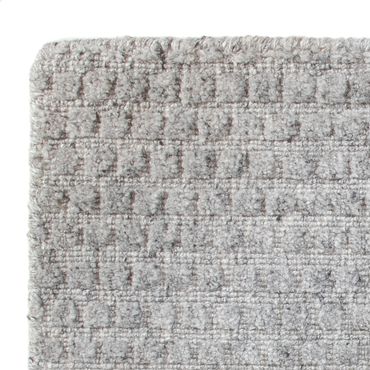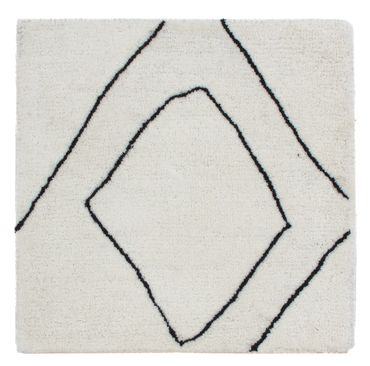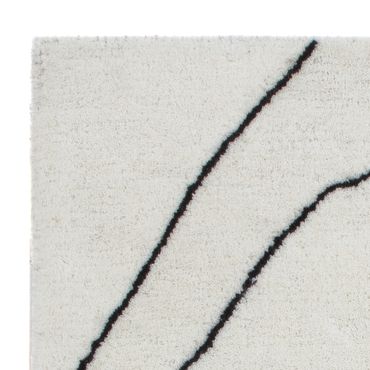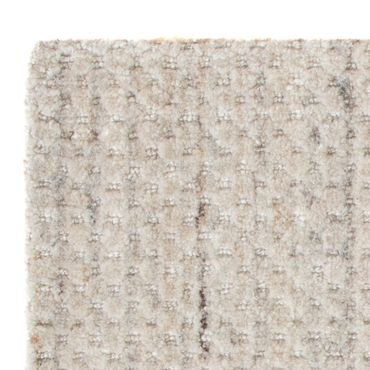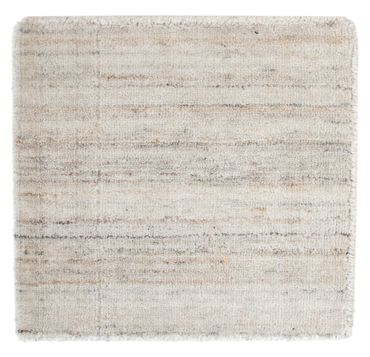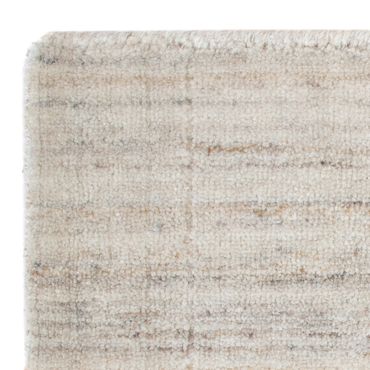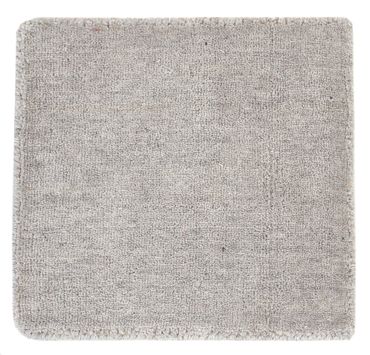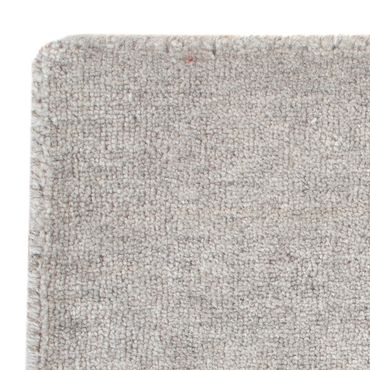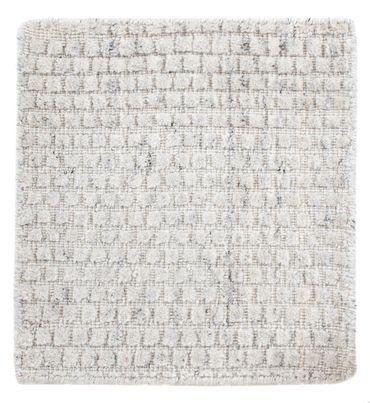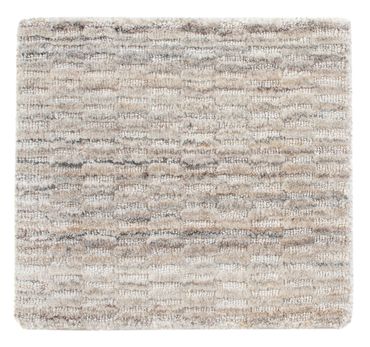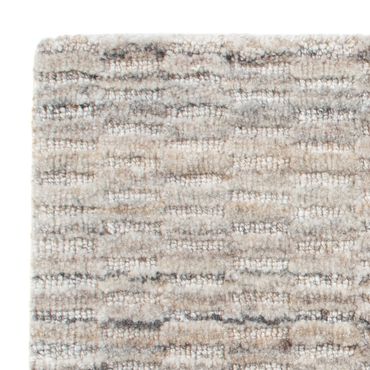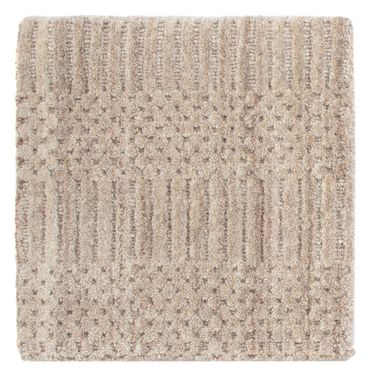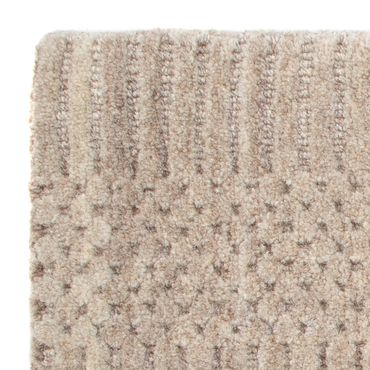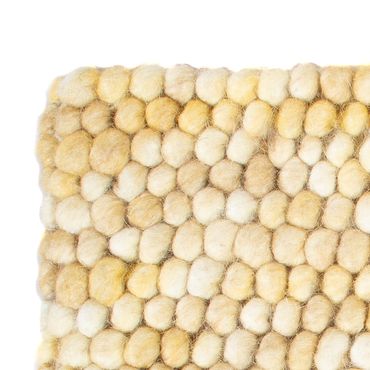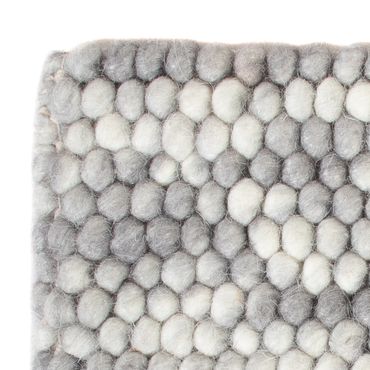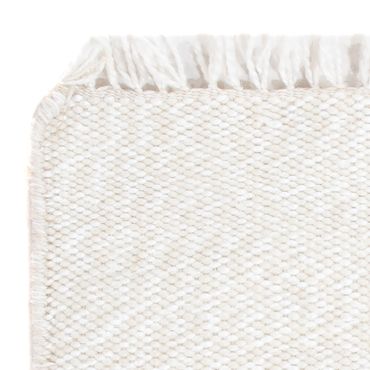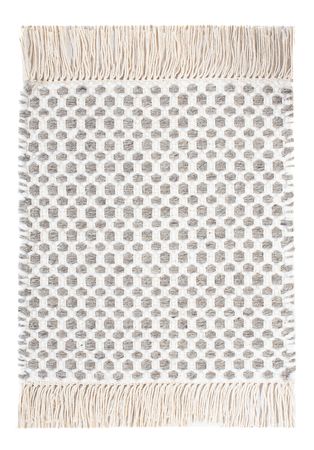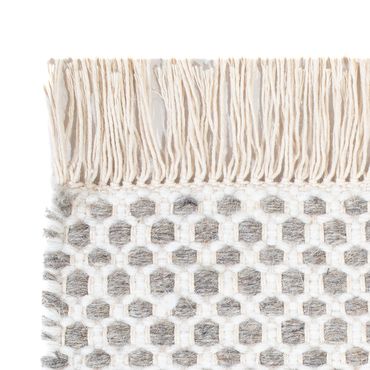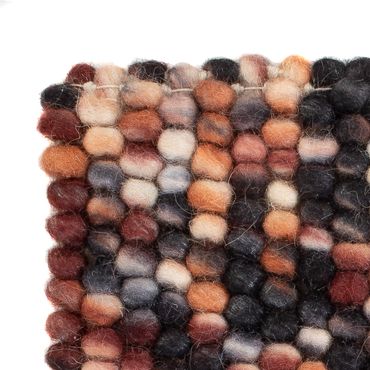- Gabbeh Rug - Indus - Agra28 £
52 £ - Gabbeh Rug - Indus - Agra28 £
56 £ - Gabbeh Rug - Indus - Agra28 £
56 £ - Gabbeh Rug - Indus - Agra28 £
52 £ - Gabbeh Rug - Indus - Agra28 £
56 £
- Designer Rug - Kareem - square394 £
786 £
-
- Vintage Rug - Didier - square2,773 £
-
The wool rug – versatile, stylish, and sustainable
Wool rugs bring a stunning naturalness to any home, combining wool and virgin wool with beautiful designs to complement any interior style. The raw material is obtained from the fleece of sheep and goats; ancient fibres that have been valued for thousands of years. The unique properties of these materials are able to give rooms a welcoming aesthetic that radiates warmth and cosiness.
But that's not all. Wool is also water-repellent and heat-regulating, which is obvious when you consider where it comes from. When it's hot, it releases heat; when it's cold, it retains heat. And of course, wool is soft, easy to dye, and can be used in a variety of ways.
Wool rugs are eye-catchers and very popular. They improve the room climate and acoustics and keep your feet warm. No matter whether you prefer it smooth or soft – there is something for every taste! They are robust and easy to care for and fit easily into existing living styles. The nature of the rug depends mainly on the ‘processing method’ of the wool fibres.
Craftsmanship: knotting, weaving and more
These are the most commonly used techniques:
1. knotted weave (e.g. Persian rugs, Oriental rugs, Berber rugs):
Frequency: very common, especially in high-quality wool rugs.
Execution: This technique is used mainly for the production of hand-knotted rugs, as found in Oriental and Persian rugs. Each individual wool thread is manually knotted around two warp threads, creating a dense and durable surface. This results in exceptionally durable rugs, which often feature elaborate patterns and designs. The density of the knots determines the fineness and durability of the rug.
Ideal for: luxurious living areas, representative rooms, areas with medium to high traffic.
2. Hand-weaving technique (Gabbeh, silk rugs, Afghan rugs):
Frequency: very common in flat-woven rugs and runners.
Execution: In this traditional technique, the warp and weft threads are manually interwoven on a loom. This technique is used to create a flat, dense woven rug, often with geometric or traditional patterns. A hand-woven wool rug is usually firmer and flatter in structure than a knotted one, but is highly durable.
Ideal for: living and dining areas, hallways, high-traffic areas where resilience and easy maintenance are important.
3. Flatweaves (e.g. kilim, sumak):
Frequency: Widely used, especially for decorative and ethnic rugs.
Style: Flat-woven rugs, such as kilims and sumaks, are rugs without pile. The woolen threads are woven in a minimalist, flat structure, often with reversible patterns (i.e., identical and usable on both sides of the rug). These rugs are lightweight, easy to transport, and highly durable. They are particularly known for their traditional designs, which consist of geometric shapes and patterns.
Ideal for: living and dining rooms, hallways, wall-to-wall installations, or decorative accents.
4. Hand-tufted (e.g. designer rugs, children's rugs):
Frequency: Common for modern, custom-designed rugs.
Construction: Hand-tufted describes a rug in which the yarns are shot into a pre-drawn pattern on a backing material using a special tufting gun. The back of the rug is then glued to a scrim to hold the yarns in place. This method enables quick and cost-effective production, as well as the creation of complex patterns and designs with different pile heights (high-low effect).
Ideal for: Bespoke rugs, creative and modern living spaces, and rooms where design flexibility is required.
5. Loop pile (e.g. sisal rugs):
Frequency: Relatively common, especially in hard-wearing rugs.
Construction: In this technique, the pile remains uncut, creating loops. These loops provide a robust and textured surface that is highly resistant to wear. Loop-pile rugs are particularly easy to clean and show fewer signs of wear, making them ideal for high-traffic areas.
Ideal for: hallways, entryways, stairs, offices, or anywhere high traffic is required.
6. Loop pile (e.g. shaggy rugs):
Frequency: Less common, but popular for luxurious rugs.
Construction: This technique creates a velvety, soft surface as the wool fibres are worked to stand upright. Shag pile rugs are exceptionally soft to the touch and offer a luxurious look. However, they are less durable than other techniques and are better suited for less high-traffic areas.
Ideal for: bedrooms, living rooms, and showrooms where comfort and elegance are paramount.
Colour & Structure - the basis for individual design
Anyone who wants to buy a wool rug wants it to match their existing furnishings. Whether woven, fringed, handmade, mottled, short-pile, or long-pile, the natural fibre has exquisite properties that people like to adopt.
To make this as easy as possible, Morgenland offers a wide selection of facets and combinations of every colour, for ‘your’ individual ‘way of living’. Colourful wool rugs bring texture and life into the home. But even in solid colours, as is often the case with a ‘Gabbeh’, wool rugs are particularly easy to integrate.
Do you like things to be minimalist? A wool rug in neutral tones, such as beige, lends simple elegance and goes excellently with Scandinavian-inspired furniture, among other things. Fortunately, natural colours are not only cosy, but also make your rooms appear brighter and larger at the same time.
Spatial flexibility – wool rugs for every living area
Living and dining room – the supreme disciplines
Wool rugs are timeless. A pure new wool rug under the coffee table, e.g. in white or beige, or a robust hand-woven rug in the dining area, will certainly ensure a feel-good atmosphere. And if the dining table is round, why not choose a matching round wool rug? Either way, only the best for your guests.
Bedroom plus deep-pile?
The character of a wool rug is particularly suitable for the most private of all retreats; perhaps in a 200x300 cm version, depending on the size of the bed. This is because wool brings a very unique, but always pleasantly cosy aura to the interior; visually and haptically! The shimmering of the fibres when lit at night is just as appealing as the caress of the senses when you wake up in the morning.
If your floor is already doing a good job and you don't want to end up in a conflict situation, runners made of wool or pure new wool are the perfect compromise. These can be placed wonderfully at the sides and/or at the foot of the bed. This way you get the best of both worlds.
Is a wool rug also suitable for a child's room?
A children's rug should be cosy, inviting and elastic to withstand the temperament of little ones. Ideally, it should be able to store heat well and be easy to clean. In this demanding environment, a wool rug is particularly suitable, as it has all these qualities.
Hand-woven wool rugs are particularly resilient and durable. What's more, wool can be processed without any harmful substances and gives your kids the necessary grip to stand securely on their own two feet from the outset.
Hallway – first impressions count
The hallway is the first room you enter, and a wool rug can create a friendly atmosphere here. Since the hallway is often heavily used, a flat-woven wool rug is particularly suitable. It is durable, hard-wearing and at the same time creates a cosy atmosphere. Whether in muted colours, with discreet patterns, or striking designs – a wool rug gives the entrance area character and structure. Even in narrow hallways, wool rugs can immediately welcome guests.
Formats & Dimensions
At Morgenland, you can buy wool rugs online and choose the shape that suits your room from the comfort of your own home.
Even if most rooms are rectangular, you can cleverly accentuate certain areas with a cosy, round rug. This also works very well in hallways, with a suitably sized rug runner.
Wool rugs are available in the most diverse sizes. To get a feeling for what might be suitable for you, here is a spectrum of formats that you will find at Morgenland:
from 60 x 40 cm (and smaller) to 600 x 400 cm (and larger) - for rectangular rugs
from 80 x 80 cm (and smaller) to 400 x 400 cm (and larger) - for square rugs
from 180 x 120 cm (and smaller) to 350 x 250 cm (and larger) - for oval rugs
from 200 cm to over 400 cm in length - for runners
and a wide range of ‘special shapes’ and ‘custom-made’
care - Nobody is perfect!
A wool rug is a loyal companion. If, however, something should unexpectedly go wrong, it just needs a little attention to ensure that your rug stays in top form.
Depending on the type and severity of the contamination, there are some simple methods for remedying a mishap:
You can easily remove the worst of it from wool rugs by vacuuming them weekly. They are naturally dirt-repellent, thanks to sheep's wool. Just be sure to use a nozzle without a rotating brush to protect the material.
It's best to remove stains immediately. Gently dab up spilled liquids with a clean, dry cloth. If necessary, use lukewarm water and a mild detergent (e.g. wool detergent) to make a soap solution.
Turn the rug regularly to ensure even wear and minimise potential colour changes caused by sunlight.
Professional rug cleaning every few years helps remove deep-seated dirt and dust and extend the rug's lifespan.
As a general rule, cleaning wool rugs is straightforward.
How much does a real wool rugs cost?
To get a rough idea of the prices of wool rugs, you can compare them with this table:
Size (in cm) | Price example | Notes |
120 x 170 | 150 - 200 € | Ideal for small rooms or as a highlight |
160 x 230 | 250 - 400 € | Standard size for the living room |
200 x 300 | 400 - 600 € | Large, suitable for larger rooms |
250 x 350 | 600 - 800 € | Luxurious, fills the room |
Prices may vary depending on the brand, quality, and design.
Your benefits – how you benefit
A wool rug brings natural sophistication and quality to your home. Its durability and resilience make it an ideal choice for demanding living spaces. Wool is sustainable, stain-resistant, sound-absorbing, and fire-retardant. Its luxurious surface sets stylish accents and enriches any environment.
Buying a rug online also has many advantages. You can conveniently choose from a huge selection of wool rugs of the best quality, without having to trawl through discount stores. You can choose from a wide range of payment service providers or use ‘purchase on account’, get the goods delivered, benefit from free return shipping, and take advantage of the 31-day right of return.
‘Rug heart, what more could you want?’
FAQ:
How do I properly care for wool rugs?
Regular vacuuming is important. Stains should be dealt with immediately: gently dab the stain with a clean, damp cloth and use a mild wool detergent in a soap solution to treat stubborn stains.
Can I wash my wool rug myself?
It is not recommended to fully wash wool rugs, as too much moisture can damage the wool. Instead, stains should be treated spot-on or professionally cleaned.
How often should I have wool rugs cleaned?
Professional cleaning every 1-2 years is ideal to remove ingrained dirt and maintain the rug.
Do wool rugs fade in sunlight?
Yes, like many natural materials, direct sunlight can cause fading of the colours. It is advisable to turn the rug regularly to ensure even wear.
Are wool rugs suitable for allergy sufferers?
Yes, wool rugs are often a good choice for allergy sufferers. Wool is hypoallergenic because it attracts and binds dust and pollen instead of releasing them into the air. Regular vacuuming helps to remove these particles.
Is a wool rug suitable for households with pets?
Yes, wool rugs are suitable for households with pets as they are durable and easy to clean. However, make sure you use a suitable quality and treat stains quickly to ensure a long lifespan.
What about the durability of wool rugs?
With proper care and regular cleaning, a wool rug can last for many years, often even decades. Wool is a very durable material that remains resilient even with heavy use.
Can a wool rug slip?
Yes, especially on smooth surfaces, a wool rug can slip. Using a non-slip underlay or rug mat will help keep it in place and prevent accidents.
